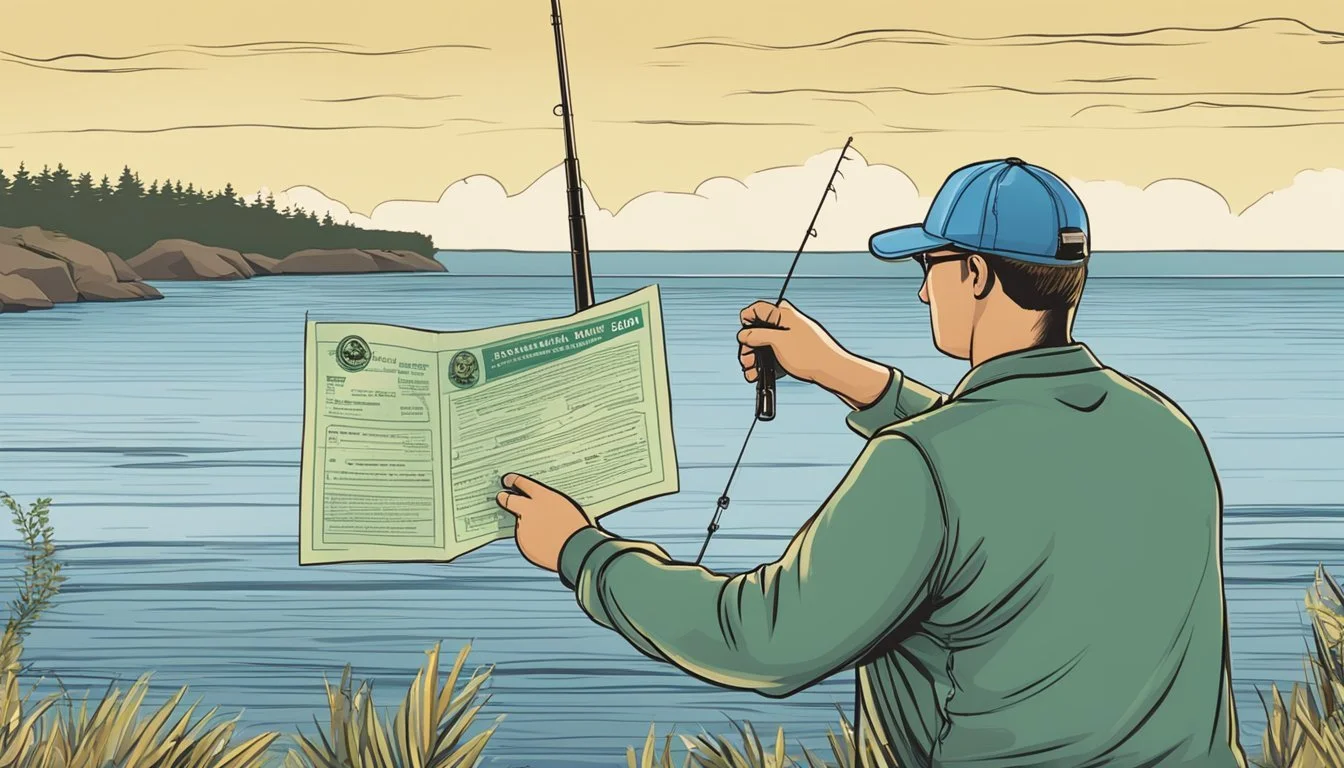How to Get a Rhode Island Saltwater Fishing License
A Simple Guide
Anglers looking to enjoy the marine bounty of Rhode Island need to obtain a saltwater fishing license. This requirement applies to anyone wishing to fish (What wine goes well with fish?) recreationally in Rhode Island marine waters, including offshore federal waters. The state offers various licenses, catering to different categories of fishermen, be it residents, non-residents, seniors, or active military personnel.
Securing a license in Rhode Island is a straightforward process. Residents and non-residents alike have the option of purchasing a license, with the general fee for a resident license being $11. For non-resident landowners who are current on their property tax obligations, a different fee structure applies. Special provisions also exist for seniors and active military personnel, reflecting the state's commitment to accessibility and appreciation of service.
Rhode Island acknowledges the importance of marine conservation and responsible angling. By mandating a license, the state ensures that fishing activities are regulated, which helps in the conservation of aquatic life. The process not only aids in sustaining fish populations, but it also collects essential data that assists with the management and improvement of fishery resources for future generations.
Understanding the Basics
Fishing in Rhode Island’s marine waters requires adhering to specific licensing rules. Gaining a clear understanding of these regulations ensures compliance and contributes to marine conservation efforts.
What Is a Saltwater Fishing License?
A saltwater fishing license is an official permit required for individuals to legally fish in saltwater bodies within Rhode Island's jurisdiction. This license is mandatory for most anglers aged 16 or older, with some exemptions applied to seniors and active military personnel.
Distinction Between Saltwater and Freshwater Licenses
Rhode Island issues distinct permits for different types of fishing environments. A saltwater fishing license is specifically for marine waters, whereas a freshwater fishing license applies to inland water bodies. Anglers must ensure they obtain the correct license corresponding to their intended fishing activity.
Key Terms for Rhode Island Anglers
Rhode Island Marine Waters: Areas where a saltwater license is required. Reciprocal Licensing: Recognition of saltwater fishing licenses from certain other states. Angling: The act of fishing with a hook and line. Spearfishing: An alternative fishing method requiring its own regulations. Recreational Lobster Pot License: A permit allowing the holder to fish up to five lobster (What wine goes well with lobster?) pots, provided they are properly tagged as per RIDEM guidelines.
Eligibility and Requirements
In Rhode Island, specific regulations govern who is required to obtain a saltwater fishing license, along with considerations based on age and residency. Special provisions also apply to both residents and non-residents, ensuring compliance and facilitation of recreational fishing within state waters.
Who Needs a Saltwater Fishing License?
All individuals 15 years of age or older must have a Rhode Island Recreational Saltwater Fishing License to fish in Rhode Island marine waters as well as offshore federal waters. Those pursuing recreational fishing activities, including angling and spearfishing, are necessitated to adhere to this requirement. A saltwater fishing license is also a prerequisite to take or attempt to take finfish from shoreline or boat, fish with a spear, or fish by any other means in the marine waters of Rhode Island.
Age and Residency Considerations
Residents: Any person who is a resident of Rhode Island and 15 years of age or older is required to obtain a license to fish in saltwater areas.
Non-Residents: Non-residents of the same age must also acquire a license but have the option to use a license from a reciprocal state or register federally, depending on the regulations.
Reciprocal States: Currently, Rhode Island recognizes reciprocal fishing licenses from neighboring states such as Connecticut for specific waters and with Massachusetts for Wallum Lake.
Special Provisions for Residents and Non-Residents
Rhode Island offers certain special provisions for different categories of residents and non-residents:
Seniors: Often have different fee structures or exemptions.
Armed Forces: Active military personnel may enjoy specific exemptions or reduced rates.
Exemptions: Certain groups of people may be exempt from the requirement of obtaining a license.
Each category may have distinctive criteria, and potential applicants should contact the Rhode Island Department of Environmental Management's Marine Fisheries Program for precise details on eligibility, cost, and application process.
How to Obtain a License
Obtaining a Rhode Island saltwater fishing license is a straightforward process that can be completed either online or through various vendors. Applicants will need to have all necessary documentation ready to ensure a smooth application process.
Online Application Process
Individuals can apply for a Rhode Island saltwater fishing license online by visiting the official Rhode Island Department of Environmental Management (RIDEM) website. The applicant must create an account and provide accurate personal information. They should follow the step-by-step instructions to complete the application and submit the required fee using a credit or debit card.
Purchasing From Vendors
Alternatively, licenses can be purchased in person from authorized vendors. These vendors include tackle shops, sporting goods stores, and other retail outlets registered with the RIDEM. Physical locations offer the advantage of personal assistance during the purchasing process.
Additional Documentation Needed
Applicants must have certain documentation ready, whether applying online or in person:
Proof of residency (for residents)
Identification such as a driver's license or government-issued ID
Payment method (credit/debit card for online, various options for in-person)
It is crucial that this information is current and valid to ensure the license is issued without delays.
License Types and Fees
In Rhode Island, the cost and type of saltwater fishing license required will vary depending on one's residency status and the desired duration of fishing privileges. Licenses are mandatory for recreational fishing in Rhode Island's marine waters.
Resident Licensing Options
Residents of Rhode Island can purchase an annual saltwater fishing license. Additionally, senior citizens and active military personnel are eligible for reduced fees or exemptions.
Non-Resident and Tourist Licenses
Non-residents have the option to purchase an annual saltwater fishing license, and those owning property in Rhode Island can obtain a license at a special rate, provided they are current on their property taxes. A temporary seven-day RI license is available for tourists who are looking for a short-term fishing option.
License Cost Structure
Annual License for Residents: $7.00
Annual License for Non-Residents: $10.00
Temporary Seven-Day License for Tourists: Costs vary
All license fees contribute to the conservation and enhancement of Rhode Island's marine resources, ensuring a positive impact on the local environment and fishing conditions.
Rules and Regulations
Rhode Island saltwater fishing regulations are designed to conserve marine life and ensure sustainable practices among anglers. These rules are strictly enforced and must be adhered to by anyone fishing in the state's coastal waters.
Fishing Seasons and Guidelines
Fishing seasons in Rhode Island are established to protect fish populations during critical times such as spawning. Anglers should consult the Rhode Island Department of Environmental Management (DEM) for specific season dates as they can vary yearly for different species. It is essential that fishermen adhere to these seasonal guidelines to maintain healthy fish populations.
Harvesting Limits and Conservation Rules
Harvesting limits are set to prevent overfishing and ensure a stable ecosystem. Rhode Island imposes both size and possession limits on many fish species. For example, regulations may state that the minimum size for American Eel is 9 inches, with a possession limit of 25 eels per person per day. These limits can change, so anglers should always check current regulations before fishing. Conservation contributes to the overall health of marine life and supports long-term sustainability for recreational fishing.
Federal and State Water Regulations
Fishermen must differentiate between federal and state water regulations, as they can differ significantly. State waters extend out to three nautical miles from the shoreline, and beyond that, federal regulations apply. In Rhode Island, a recreational saltwater fishing license is required to fish in marine waters and offshore federal waters. Compliance with both sets of regulations—state and federal—is required for all recreational fishing activities. Additionally, the data collected from marine recreational fishing contributes to the assessment and management of fishery resources.
Additional Permits and Endorsements
When looking to fish in Rhode Island beyond the standard saltwater fishing license, additional permits and stamps are required for specific species and activities such as shellfishing (What wine goes well with shellfish?) and lobstering.
Shellfish and Recreational Lobster Licensing
A Recreational Lobster License allows individuals to harvest lobsters for personal use. To engage in lobstering, one must also hold a saltwater fishing license and adhere to the regulations concerning size, season, and trap specifications. Shellfish licenses are separate and necessary for those wishing to harvest shellfish in Rhode Island waters.
Recreational Shellfish License Requirements
For shellfishing, a Recreational Shellfish License is mandatory. This license covers the harvesting of species such as clams (What wine goes well with clams?), oysters (What wine goes well with oysters?), mussels, (What wine goes well with mussels?) and other invertebrates. Regulations regarding minimum sizes, quantities, and allowable areas are strictly enforced and must be observed by license holders.
Trout Conservation Stamp and Other Stamps
To fish for trout or to hold certain species of fish in Rhode Island, anglers are required to purchase a Trout Conservation Stamp. This stamp is essential for both freshwater and some saltwater fishing activities associated with trout. There might also be other specific stamps and endorsements needed for various fishing activities, each designed to support conservation efforts and manage the fish population effectively.
Recognizing Reciprocal States
When obtaining a Rhode Island saltwater fishing license, it's essential to understand the state's reciprocity agreements, as these can determine whether an angler needs to purchase an additional license when fishing in neighboring states.
How Reciprocity Affects Licensing
Reciprocal agreements allow residents of Rhode Island to fish in waters of neighboring states without obtaining a separate license, and likewise, for residents from those states when fishing in Rhode Island waters. This can be both convenient and cost-effective for anglers who frequent multiple states for recreational fishing.
States with Reciprocal Agreements
Rhode Island has established reciprocal fishing license agreements with several states. Here are the states that currently honor Rhode Island saltwater fishing licenses, as well as accept their licenses in Rhode Island waters:
New York
Connecticut
Massachusetts
Residents should verify the latest information on reciprocal licensing as policies can change, and certain restrictions may apply to specific areas or types of fishing.
Conservation Efforts and Contributions
Rhode Island's commitment to saltwater fishing extends beyond the issuance of licenses. The conservation programs and initiatives funded by license fees play a fundamental role in ensuring the sustainability of marine ecosystems.
Understanding Habitat Development Initiatives
Rhode Island's Department of Environmental Management (DEM) is involved in habitat development as a key to conserving marine life. Constructing artificial reefs enhances marine habitats, providing more spaces for fish populations to thrive. These initiatives prioritize both the health of the marine ecosystem and the enhancement of fishing experiences for anglers.
Key Projects: Building oyster restoration sites, eelgrass planting efforts.
Goals: Increase biodiversity, foster growth of commercial and recreational fish species.
Marine Stewardship and Education Programs
The state emphasizes education as a pivotal component of marine stewardship. Programs are designed to educate the public about responsible fishing practices and the importance of protecting marine environments. Outreach efforts include:
Educational Workshops: Teaching sustainable fishing techniques.
Public Awareness Campaigns: Highlighting the impacts of overfishing and pollution.
These programs aim to cultivate a community of anglers who are not only informed about marine ecosystems but actively contribute to their preservation.
Fishing Without a License
In Rhode Island, certain individuals and scenarios allow for saltwater fishing without the necessity of a license. Understanding the exemptions and designated free fishing days can enhance your fishing experience.
Exemptions and No-License Scenarios
Exemptions: Certain groups of people are exempt from requiring a saltwater fishing license in Rhode Island.
Seniors: Individuals aged 65 and above.
Active Military Personnel: Current members of the armed forces.
Reciprocity: Holders of valid saltwater recreational fishing licenses from New York, Connecticut, Massachusetts, or Maine.
No License Needed: Fishing without a license is permissible in specific locations within Rhode Island.
Public Saltwater Fishing Areas: There are designated spots along the Rhode Island coastline where no fishing license is required.
Free Fishing Days and Events
The state of Rhode Island periodically allows individuals to fish without a license during special events or on certain days, known as Free Fishing Days.
Events: Check with the Rhode Island Department of Environmental Management for scheduled events that might allow license-free fishing.
Designated Days: Usually, there are specific dates throughout the year where everyone can fish without a license, providing a great opportunity to try fishing or introduce the sport to new anglers.
Penalties and Enforcement
In Rhode Island, adherence to saltwater fishing regulations is strictly enforced to protect marine life and support sustainable fishing practices. Non-compliance with state law and federal registration requirements can result in significant legal repercussions and fines.
Violations and Consequences
State Law: Individuals caught without a valid Rhode Island Recreational Saltwater Fishing License face penalties. Consequences of such violations include:
Fines: Monetary penalties vary based on the severity and frequency of the offense.
Legal Action: Repeat offenders may face heightened legal consequences, including potential court appearances.
Endangered Species Programs: Violating regulations that protect endangered species is a serious offense, with strict penalties enforced by both state and federal agencies.
Federal Registration: Anglers must comply with federal registration requirements when fishing in federal waters. Failure to do so may result in fines and legal action, similar to state penalties.
Reporting Illegal Activities
The Rhode Island Department of Environmental Management encourages the reporting of illegal fishing activities. Responsible parties can be reported through the following channels:
Phone: Contacting the department directly during business hours.
Online Tip Submission: Utilizing the state's official website to submit a violation report.
It is important for individuals to report suspected illegal activities to help maintain healthy fish populations and uphold the integrity of Rhode Island's fishing regulations.
Additional Resources and Information
For anglers seeking to obtain a Rhode Island saltwater fishing license and ensure compliance with state regulations, two key resources provide accurate and up-to-date information.
Accessing Official Rhode Island Regulations
The Rhode Island Department of Environmental Management (DEM) is the authority that oversees fishing regulations in the state. Anglers can refer to the DEM's official website or contact the Marine Fisheries Program directly at (401) 423-1923 for detailed information regarding saltwater fishing licenses. It's essential for individuals to familiarize themselves with the rules, which can vary by location, such as those specific to popular spots like Block Island.
Official Website: Anglers can go online to view comprehensive regulation guides.
Marine Fisheries Program Contact: Direct communication with the DEM provides an opportunity to ask specific questions about regulations.
Educational Materials and Support Services
The Department of Environmental Management also offers educational materials and support services aimed at conservation education and maintaining the state's fisheries. Prospective and current license holders can benefit from these resources to better understand the local ecosystems and the significance of their contributions through the purchase of a Rhode Island fishing license.
Conservation Programs: Information on how funds from license fees are used to support local fisheries.
Habitat Development: Insight into projects aimed at preserving and improving fish habitats.
Anglers are encouraged to use these resources to stay informed about the responsibilities and best practices in saltwater fishing within Rhode Island.
Frequently Asked Questions
Before diving into the specifics, it's essential to understand that maintaining a valid Rhode Island saltwater fishing license (RIHFID) is crucial for fishing legally, and being aware of local regulations ensures responsible fisheries management.
How to Update or Replace a Lost License
If a licensed angler has lost their Rhode Island Saltwater Fishing License, or it requires updating, they should immediately contact the Rhode Island Department of Environmental Management (DEM). They can do this by calling (401) 423-1923 during business hours (Monday-Friday, 8:30 am - 4:00 pm) or by visiting the DEM's online system. It is vital to keep the RIHFID current to avoid any legal issues while fishing.
Information on Rhode Island Fishing Regulations
Anyone interested in the legal sizes, seasons, and possession limits for saltwater fishing in Rhode Island should refer to the state's Department of Environmental Management website. This will provide up-to-date information on regulations which are essential for both recreational and commercial fishers to follow. Regulations can vary annually, so fishers must check for updates to stay compliant.
Special Circumstances and Considerations
In Rhode Island, certain individuals or circumstances allow for different stipulations when applying for a saltwater fishing license. Special considerations are applied to fishing from charter vessels, active military and veterans, and those with disabilities requiring special assistance.
Fishing from Charter Vessels
Charter boats in Rhode Island often include the cost of fishing licenses in their overall service package. It is imperative for anglers to verify with the charter company whether a separate fishing license is necessary before embarking on their trip.
Active Military and Veteran Benefits
Active military personnel and veterans with a valid identification can enjoy certain privileges when obtaining a fishing license in Rhode Island. Benefits provided may include reduced fees or exceptions. For specific benefits or requirements, contacting the Rhode Island Department of Environmental Management is recommended.
Disabilities and Special Assistance
Individuals with disabilities may be eligible for certain exemptions or special accommodations regarding their saltwater fishing license. A documented disability rating is typically required to process these special cases. Assistance and information can be acquired by reaching out directly to the responsible state department.
Locations and Destinations
When pursuing saltwater angling in Rhode Island, anglers have access to a diverse range of fishing environments from the expansive Narragansett Bay to the state's numerous lakes and rivers. These locations not only offer ample fishing opportunities but also require specific navigational awareness for the best experience.
Popular Fishing Spots in Rhode Island
Narragansett Bay serves as a hub for saltwater fishing, offering anglers a chance to catch a variety of species. Key locations within the bay include:
Conimicut Point: Known for its excellent striped bass fishing.
Patience Island: A popular spot for finding flounder and tautog.
Apart from the bay, there are several lakes and ponds rich with marine life. Noteworthy mentions include:
Wyoming Pond: Ideal for quiet angling experiences.
Olney Pond in Lincoln Woods State Park: Offers good fishing for trout and largemouth bass.
Navigating Rhode Island's Marine Waters
Anglers should be prepared for the conditions of Rhode Island's marine waters. Here are some tips:
Understand Tides: Tides in Narragansett Bay can significantly influence fishing success. Accessing tide charts in advance can help plan the trip better.
Boat Safety: Ensure that all safety regulations are followed when boating on Rhode Island's waters, especially if heading into the open ocean beyond the bay.
By knowing the top fishing locations and how to navigate Rhode Island's diverse marine environments, anglers can maximize their chances of a successful and enjoyable fishing experience.
Catch Reporting and Data Management
To ensure sustainable fishing practices and accurate data collection for fishery management, Rhode Island requires detailed reporting from anglers. This is crucial for monitoring fish populations and informing regulations.
NOAA Fisheries Registration and Reporting
Anglers must register annually with the NOAA Fisheries Recreational Site Registry if they are fishing for saltwater species in Rhode Island. This registration helps to compile a national database of recreational anglers which is essential for surveying fishing effort and catch data. NOAA fisheries registration is free and can be completed online through NOAA's official website.
NOAA Fisheries Registration Steps:
Visit the NOAA Fisheries recreational site registry.
Provide required personal information.
Submit the registration form online.
State-Focused Fishery Management Strategies
Rhode Island manages its own fishery management strategies that complement federal efforts. The state requires anglers to report their catches through specific programs, such as the RI Electronic Recreational Fishing Logbook. This data is crucial for local authorities to assess fish stocks and to make region-specific regulation decisions. The state has also collaborated on applications like AnglerCatch to facilitate ease of reporting various catches directly through a mobile platform.
Catch Reporting Guidelines:
Use the AnglerCatch mobile app for voluntary reporting.
Licensed anglers should adhere to the official reporting requirements.
Compliance with both NOAA and Rhode Island reporting systems ensures that anglers contribute to the conservation of marine resources and the long-term sustainability of recreational fishing.
Tools and Equipment
In Rhode Island, the right gear is crucial for a successful and legal saltwater fishing experience. Anglers should familiarize themselves with gear recommendations while also adhering to the state's gear and tackle regulations.
Recommended Gear for Rhode Island Saltwater Fishing
Appropriate gear selection enhances the fishing experience and increases the likelihood of a good catch. The essentials include:
Rod and Reel: A medium-heavy rod with a durable reel suitable for saltwater use.
Line: Braided or monofilament line with adequate test strength for the targeted species.
Hooks: A variety of sizes based on the fish being targeted.
Lures and Baits: Various lures designed for saltwater species and live bait such as minnows.
For capturing live bait, these tools are efficient:
Minnow Traps: Suitable for catching live bait.
Dip Nets: Ideal for quickly capturing baitfish.
Umbrella Nets: Effective for catching multiple baitfish at once.
Legal Gear and Tackle Limitations
Rhode Island implements specific guidelines to preserve marine life and ensure sustainable fishing practices. Anglers must adhere to the following restrictions:
Minnow Traps: Must comply with size regulations, usually having a specific throat or entrance dimensions.
Dip Nets and Seine Nets: Legal to use, but with constraints on size and mesh opening to protect juvenile fish.
Umbrella Nets: Generally allowed but should be checked for any specific restrictions.
Always verify current regulations with the Rhode Island Department of Environmental Management before using any gear to ensure compliance.
Fishing Techniques and Tips
In Rhode Island, successful saltwater angling hinges on understanding the local marine environment and mastering a range of techniques suited to the target species.
Strategies for Successful Saltwater Angling
Recreational saltwater anglers in Rhode Island can employ various strategies to improve their catch rates. Key factors include:
Tide Timing: Fishing during a moving tide can increase chances of a catch. High tide and low tide often bring different species closer to shore.
Weather Conditions: Many species are more active and feeding during specific weather patterns. Overcast days may yield better results for some fish.
Understanding Habitats: Fish congregate around natural and artificial structures. Knowing where these hotspots are, such as rocky bottoms or shipwrecks, can be crucial.
Expert Advice for Recreational Fishermen
Recreational fishermen can benefit significantly from local knowledge and experience:
Local Bait and Lures: Use baitfish that are native to Rhode Island waters for better results. Select lures that mimic the local prey.
Rigging Techniques: Learn the proper rigging for the type of fish targeted. For example, pier anglers often use a bottom-rig to attract species such as scup or striped bass.
Conservation Practices: Adhering to conservation guidelines not only sustains fisheries but can also enhance the fishing experience. Practice catch and release where appropriate.
Spearfishers, while a smaller group within the angling community, should also prioritize understanding the behavior of their target species and local restrictions to ensure a productive and responsible fishing experience.
Species and Wildlife
Rhode Island's saltwater fishing licensing regulates the harvest of various marine species to ensure sustainable recreational fishing for future generations. Protecting both common and endangered species, the license assists in maintaining the ecological balance and health of marine ecosystems.
Commonly Targeted Species in Rhode Island
In Rhode Island waters, anglers commonly seek out a range of finfish and shellfish. Popular finfish include striped bass, flounder, and bluefish, which offer both sport and sustenance for fishermen. Shellfish such as clams and oysters are also sought after, not only for commercial purposes but for recreational harvests as well. This maritime state is well-known for its abundance of squid, especially in the summer months, making it a favorite for seasoned and novice anglers alike. Blue crabs (What wine goes well with crab?) can be caught in the coastal lagoons and salt marshes, and while not as pervasive as other species, they are a treasured catch for many locals.
Finfish: Striped bass, Flounder, Bluefish
Shellfish: Clams, Oysters
Squid: Abundant in summer
Blue crabs: Found in lagoons and salt marshes
Endangered Species and Wildlife Conservation
Rhode Island takes wildlife conservation seriously, particularly when it comes to endangered marine species. Rigorous regulations protect various species of trout, salmon, and charr, with specific rules for catch limits and seasons to avoid overfishing. The state also endorses conservation programs that aim to replenish stocks and ensure the health of these key species. Always check the current rules before fishing, as they periodically change based on ongoing wildlife conservation research and monitoring efforts to protect the marine life ecosystem.
Trout, Salmon, Charr: Catch and season regulations
Through these measures, Rhode Island ensures that the joy of fishing can be sustainably shared with future generations while conserving the biodiversity and vitality of its coastal waters.















